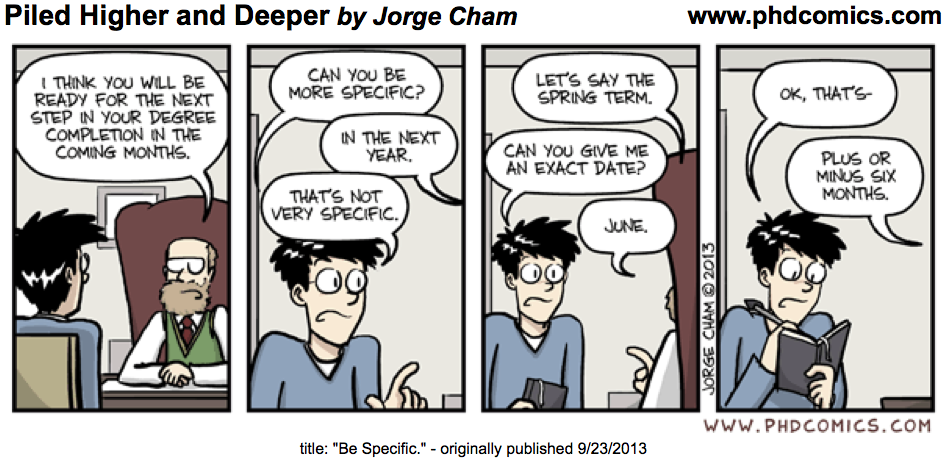Unpack implicit expectations with a Letter of Understanding
Your success has many factors, but one of the most important is the set of expectations that helps define your success. Some expectations are explicit, such as McGill policies. Other expectations are implicit, also known as unwritten or unspoken rules. The conversation you and your supervisor have when filling out a Letter of Understanding (LOU) helps you unpack one another's implicit expectations about how you will work together. Writing these expectations down allows you and your supervisor to refer back to them and re-clarify as needed.
Make implicit expectations explicit
Explicit expectations help to reduce attrition, time to completion, and supervisory conflicts.
- Explicit expectations are expectations that are clear and concrete to both students and supervisors (e.g., an official McGill policy).
- Implicit expectations, on the other hand, are the unspoken, unofficial expectations shaped by our experiences, perspectives, and values (e.g., At McGill, students will typically address their course instructor as “Professor” until explicitly instructed otherwise).
When you start a graduate program, especially if you are starting at a new university or in a new country, it can take some time to learn how to navigate the unofficial or unspoken “rules” of your program. Your supervisor, who has likely been at the institution for longer than you have, might not realize or remember all of the unspoken rules they had to learn when they first arrived. Ask questions and know that it takes time to fully learn what's expected when you enter a new role or a new environment.
Get it in writing : a Letter of Understanding establishes mutual expectations
To bring implicit expectations to the surface, discuss expectations with your supervisor directly, early on in your program.
If you are a PhD student, you will be required to upload a record of this conversation to myProgress to satisfy the Letter of Understanding milestone. A template will be available from your department to guide you through the conversation.
Most LOU templates recommend discussing the following questions:
- How often will you and your supervisor meet? Who will set up the meetings?
- How will you communicate between meetings?
- What can you expect in terms of feedback (e.g., how often, turnaround times)
- What support is available for your professional development? (e.g., conferences, workshops)
- What will your research responsibilities be? (e.g., working hours, hours in a lab, lab etiquette, safety training, etc.)
- Will there be opportunities to co-author research? If so, what is your supervisor’s policy on authorship? What is their policy on intellectual property and data ownership?
Clarifying expectations with your supervisor is an ongoing process. Return to your LOU as needed to address misunderstandings and avoid unmet expectations.
Know your responsibilities as well as your supervisor’s responsibilities
Not everything is up for discussion in a supervisory relationship. Students and supervisors are each responsible for upholding their responsibilities under University policy.
Students may find more information about their rights and responsibilities in the Handbook on student rights and responsibilities. Students should also review the McGill University Expectations for Graduate Supervision to learn more about the responsibilities of supervisors at McGill.

Comic courtesy of “Piled Higher and Deeper” by Jorge Cham, www.phdcomics.com
What do I expect of my supervisor?
A Letter of Understanding (LOU) will prompt your supervisor to clarify with you what they expect, but it will also provide clarity on what you can expect from them. Prepare to discuss expectations by reviewing your department's LOU template and thinking through what expectations you would like to clarify not just about your own role, but about your supervisor's role too.
The McGill University Expectations for Graduate Supervision touch on five core responsibilities for supervisors:
- Build and maintain a respectful, inclusive, professional research environment
- Be present and accountable by maintaining clear communication channels
- Provide supervisees with regular, timely feedback
- Respect limits in supporting supervisee wellbeing
- Know policies relevant to graduate studies, and ask for clarification if unsure
Who can you talk to about supervision?
Even with an LOU, many students still have questions about what they can expect as supervisees. Talk directly with your supervisor or with your Graduate Program Director.
The FAQ for Supervisees page answers common questions. You can also visit the Ask an Associate Dean section on this website to hear Graduate and Postdoctoral Studies Associate Deans answer questions from students in the Ask an Associate Dean video series. As part of that series, Associate Dean Nathan Hall answers a question about busy supervisors:
 This work is licensed under a
This work is licensed under a 